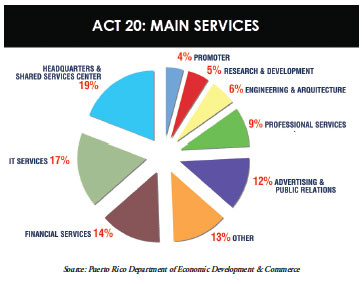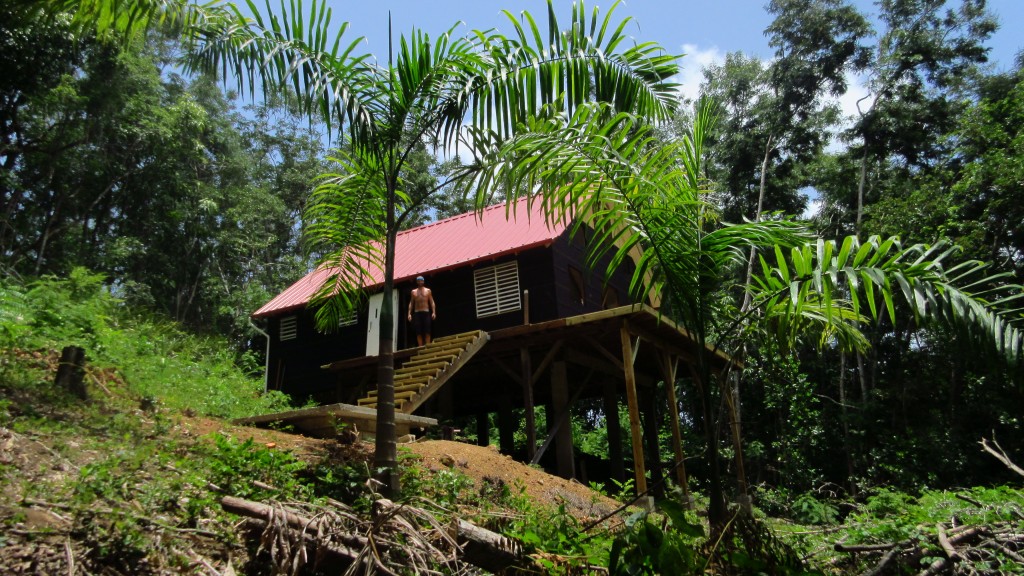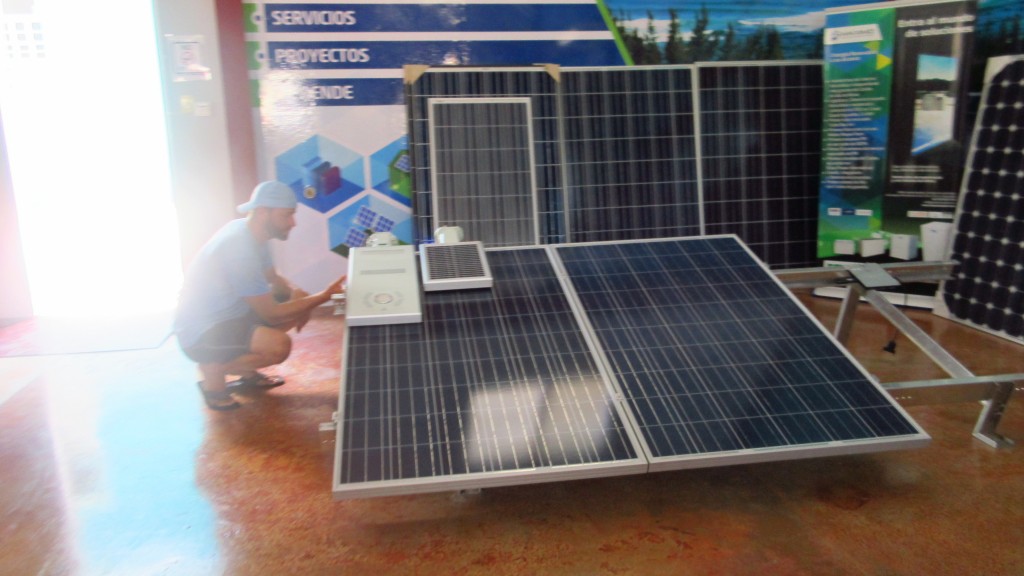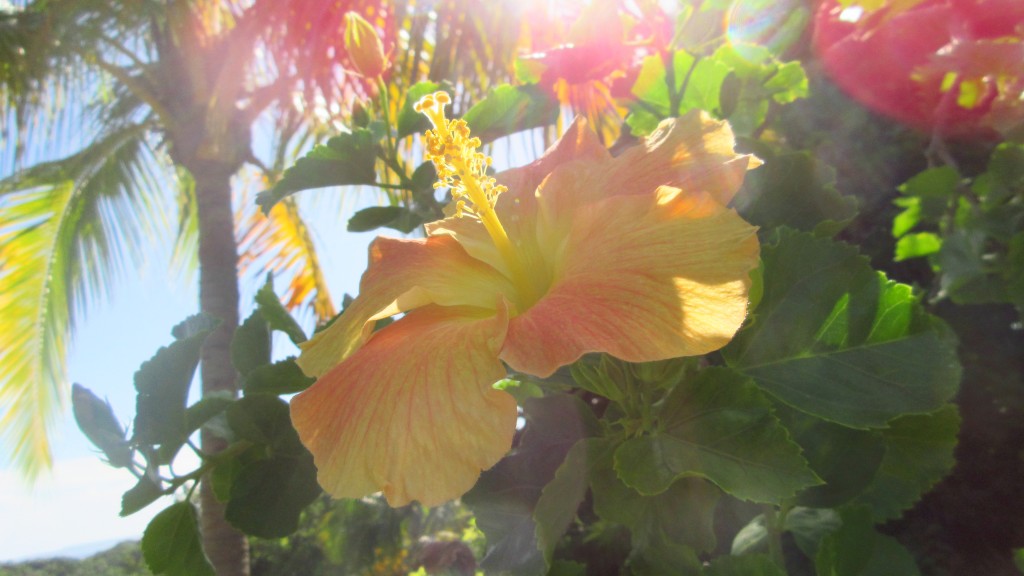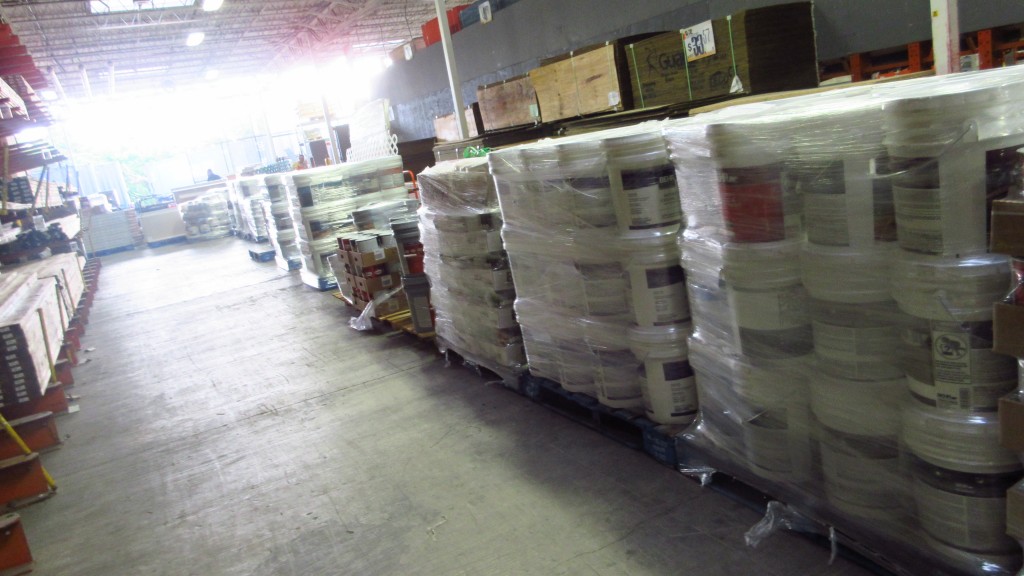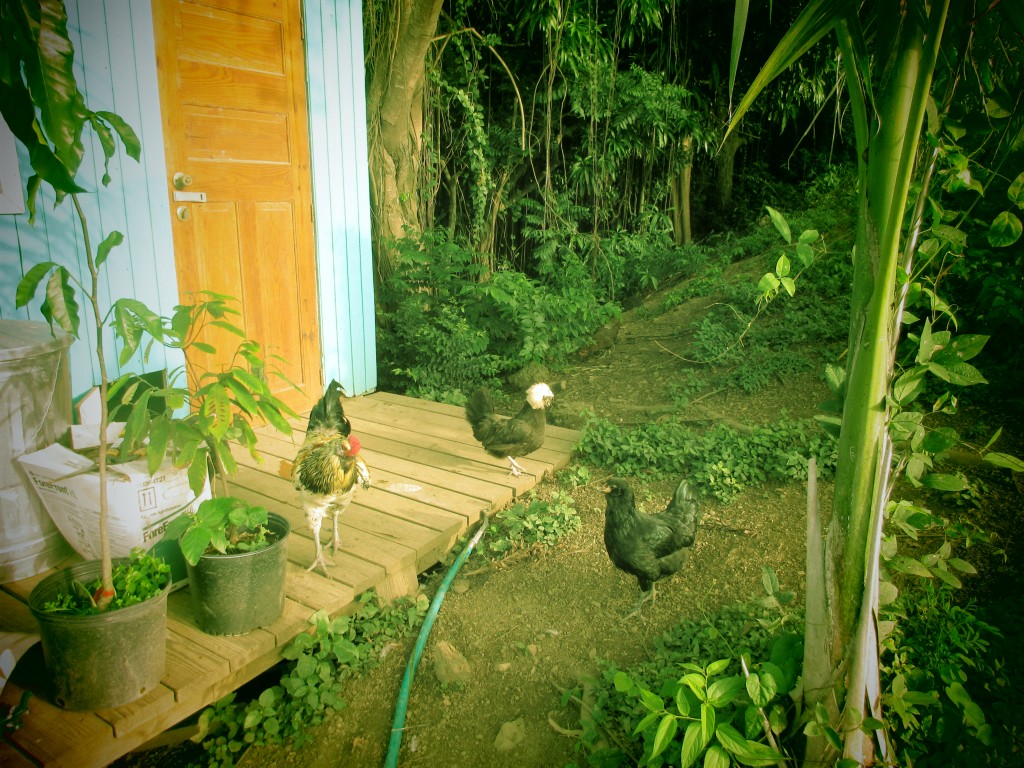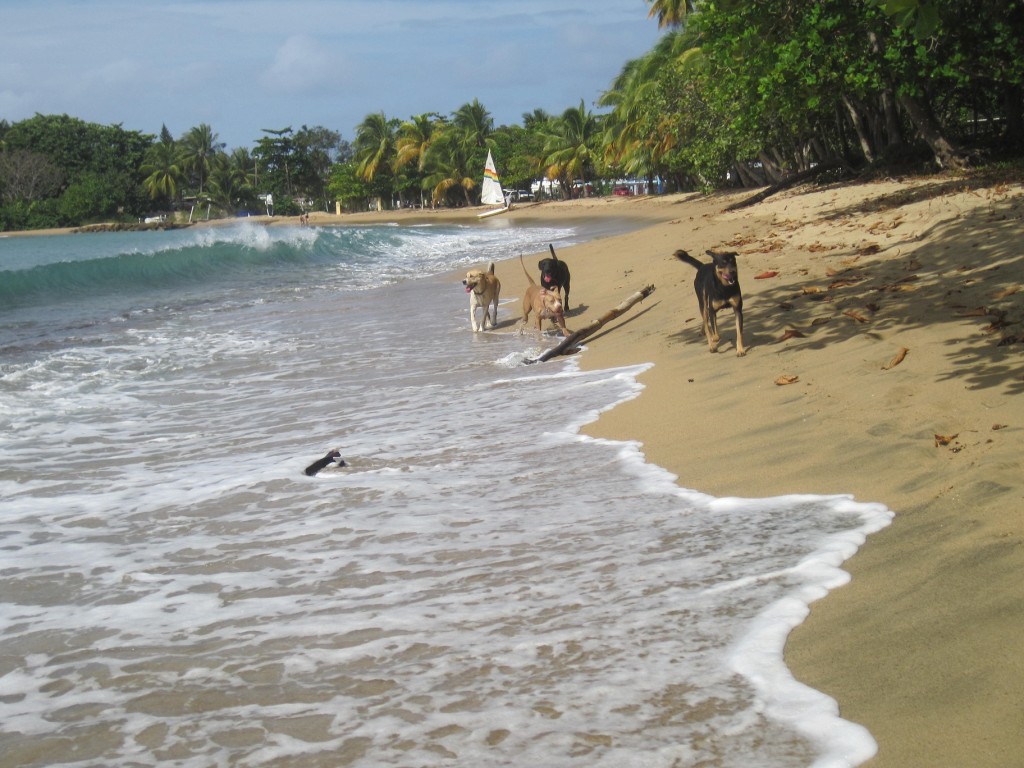
Loose dogs roaming the beach in Rincón
Animal welfare in Puerto Rico may be one of the most obvious differences a person from elsewhere notices when they visit various parts of Puerto Rico. Though it is slowly changing (more so in Rincón than some places), you may still see street dogs (known in Puerto Rico as satos), or even loose pet dogs begging for food, mating, and wandering about with pups. Sometimes they look very sickly and occasionally they are hit by cars on the side of the road. They may be causing trouble getting into people’s yards, chasing or killing other animals, dumping trash cans, or barking and fighting with other dogs.
There are also many feral cats fending for themselves and territory and even abandoned horses sometimes in the middle of the road causing traffic issues. And the pet iguanas that were released at some point long ago now outnumber the human population (and are causing some major damage to the island’s flora)!
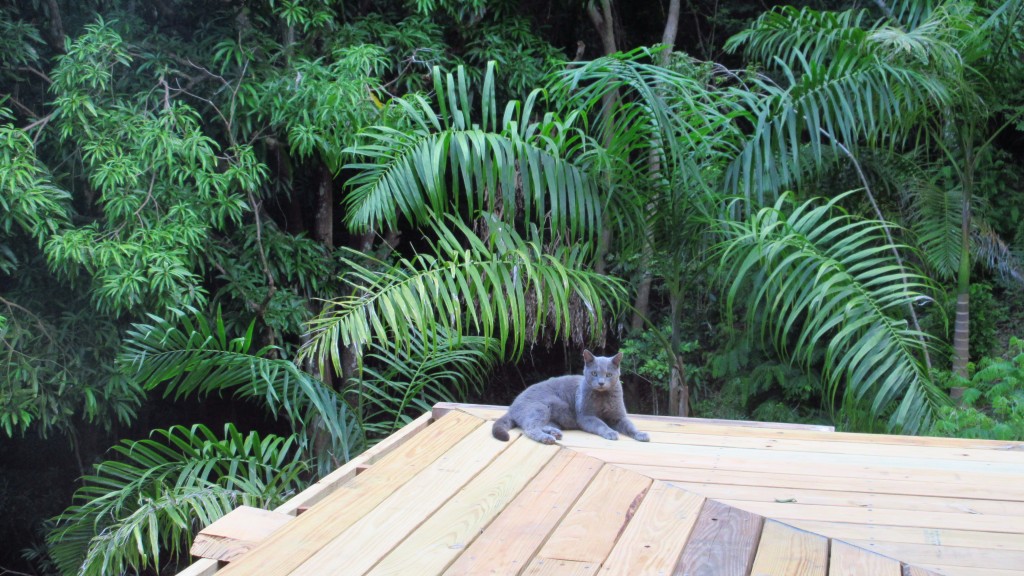
Our rescued cat, Kitty, came with us all the way from Colorado
I have always had a soft spot for animals and both our old dog Schnoodle and current cat Kitty were shelter rescues from Colorado. So I wanted to know, what is going on here in Puerto Rico, how is it changing, and what are the resources? Rather than attempt to tackle these questions myself, I decided to ask a few experts. Below are the responses from three leaders in animal welfare in the Rincón area. A huge thank you to all of them for taking time to help educate the community on this important issue!
Terrie Hayward, MEd, KPA-CTP, CPDT, CSAT, IAABC
Background/education in animal welfare
For eight years I ran a rescue group in a different part of PR & was the secretary for a group in Samoa previously. I have personally fostered hundreds of dogs (& a few cats) & worked to find appropriate, permanent homes for them.
My background is in education (MEd.) & I still work in education, however now my clients are animals & their caregivers. I’m a Karen Pryor Academy Certified Training Partner (KPA-CTP), & am also certified via the Council for Professional Dog Trainers (CPDT-KA) as well as specializing in Canine Separation Anxiety (CSAT-Certified Separation Anxiety Trainer) & Deaf Dogs & have authored the book, “A Deaf Dog Joins the Family” My business info can be found as follows: positiveanimalwellness.com & on FB.
What are the mission and goals of your organization/group/program?
I work with people & animals to improve upon communication & effect behavioral change using the science of positive reinforcement which is the route to happy, healthy lives for the animals & people who care for them.
Describe the current animal welfare situation in Puerto Rico. How is it similar or different to other places? Are there any special cultural considerations? How has it changed over the years?
Having lived outside of the US for the last 20 years & in many different locations the animal welfare situation is similar to PR in many places (including some spots within the US as well). Education is always the key from care to training to improving the overall quality of life for animals.
What are the best practices as well as new and promising practices regarding animal welfare?
Education, again, is the key. With behavior modification & training, at least half of the training is for the people. As such, providing education & information is not only good for animals & caregivers, but is beneficial to the health & safety of the community as a whole.
TNR (Trap, Neuter, Release) is the key to stable cat colonies in spots where there is an overpopulation of outdoor cats. Once there is a stable colony, feeding & monitoring stations can help in the maintenance of the colony. The link above gives additional details as to how & why this protocol works best.
70-90% of animals relinquished to shelters are due to behavioral issues. Simple problems which, when approached appropriately, can easily be avoided &/or modified.
For this reason I always suggest that when folks bring a new animal into the home they work with a certified, professional force free trainer which can set people up to get started in the right direction.
How can individuals help?
There is always something that everyone can do to help with the overall global animal welfare issues: foster, adopt, donate, volunteer.
What does responsible pet ownership mean to you? What should a person do if they can no longer care for an animal?
According to Ken Ramirez, world renowned training & behavior expert, health care, nutrition, environment, and behavior management (training and enrichment) are all necessary parts, which collectively represent a good animal welfare plan.
Caring for an animal is a life long responsibility which means that we are always striving to improve upon the above to enhance the quality of life for the animals we live with.
A lot of the focus is on dogs. Are there any specific techniques or programs regarding the different species? (Cats, horses, iguanas, or other pets for instance pythons, parrots, turtles, etc)
The US Dept. of Fish & Wildlife handles other animal calls (birds for example).
Miriam Juan, President of ARF of Rincón
My name is Miriam Juan, I have been rescuing dogs independently and with ARF of Rincon for the past 15 years. I come from a family that has been rescuing animals all my life, sometimes we would have 20 dogs at home. My parents rescued horses also.
ARF:
Animal Rescue Foundation (ARF) of Rincon is an animal welfare organization that services the town of Rincon, Puerto Rico, that started in 1997 in the face of a sad incident. It was started by a handful of devoted volunteers that would rescue and find homes for dogs and cats. Since then, it has evolved to focus on eradicating animal overpopulation. Hence, its year-round low-cost spay/neuter voucher program. It also hosts special one-day Health Day community events where a regional vet administers vaccinations while ARF volunteers schedule spay/neuter appointments. In 2014, a total of 813 pets were rescued, reunited with their families, or adopted. ARF of Rincon also work with a trainer from PAWS. ARF also participates in educational seminar at schools and in low income communities.
Contact info is ARF of Rincon, PO Box 592, Rincon PR 00677, our website is www.arfofrincon.org, our Facebook page is ARF of Rincon. office phones 787-823-7167, 939-697-8161, emergency only 787-629-1246.
Current Animal Welfare Situation in Puerto Rico:
The current animal welfare situation in Rincon is better than ever; we focus on encouraging people to sterilize, vaccinate and provide proper care for their pets. Compared to the rest of Puerto Rico we have seen a big difference in malnourished stray dogs. Cultural considerations we face are the need to change the macho ideas that male dogs do not need to be neutered as well as owners not providing adequate housing such as tied on a very short rope or being exposed to the environments such as direct sunlight and rain.
Ideal Animal Welfare Scenario
Our ideal scenario will be that every pet have a loving home with proper care. No strays in the streets starving and sickly all the while reproducing. ARF has started TNR (trap, neuter, release) for cats however we rely 100% on individual donations because we receive no grants or government support. Law enforcement is not educated enough about Law 154 (Animal Welfare and Protection law), there is also a lack of animal investigators on the western side of Puerto Rico, the responsibility to check the situation and file complaints falls completely on ARF.
How Individuals Can Help
Individuals can help by donating time, money and fostering animals. ARF of Rincon has a set protocol for people that are interested in adoption. There is only 1 shelter on the western Puerto Rico and, sadly, it is a kill shelter, which we try to avoid however we do use their veterinary center for spay and neuter because they provide considerably lower cost.
If a person finds animal, they can contact a local rescue group from the area. If the dog is aggressive or destructive, they should call the municipality or the police. However in our experience; neither are responsive.
Responsible Pet Owners
A responsible pet owner understands that a pet is a family member, will provide vetting and basic care such as food, exercise and quality time.
Other Animals:
In Puerto Rico along the coast line there is a need for better protection of the sea turtles that migrate here to lay eggs we also need to protect the hatchlings. There is also a need for horse rescue in the western area of Puerto Rico.
Areas of need
We would love to find a way to provide low income vetting (veterinarian services) for residents of Rincon.
Thanks to ARF a law was passed in 2011 in Rincon for mandatory registration of pets; however we do not have the tools or money to enforce this law
A side note: ARF has arranged to have 75% of the residents of the low income areas spay/neuter and vaccinate their pets. We have managed to make an agreement with the Family Department to allow residents to foster dogs for ARF as part of their community service hours
Cynthia Calvin, MS, President of DAR
Background and Interest in Animals
Cynthia Calvin – Masters Computer Science. In 2010 I watched a Documentary from the Rincon Film Festival – 100,000 Movie That documentary got me acting for animals in Puerto Rico – prior to that I had no animals of my own and barely noticed animals anywhere in the world. We’d moved to Rincon in 2009.
What are the mission and goals of your organization/group/program?
To read the full mission and purpose, go to: www.darrincon.org/about
We are based out of Rincon but we will help anyone in Puerto Rico rescue/help a dog, cat or horse. Homes, forever or permanent, are the hardest thing for us to find.
Defensa Animal de Rincon is a Puerto Rico based non profit working to increase sterilization rates among cats and dogs on the island while improving all animal lives through educational programs, awareness and offering assistance to animal rescuers and is funded 100% Via Donations.
Describe the current animal welfare situation in Puerto Rico. How is it similar or different to other places? Are there any special cultural considerations? How has it changed over the years?
It is pretty much the same as the documentary noted above shows it. However, because ARF has been around for so long doing amazing work, Rincon has many tourists with money who visit and rescue on their own and Rincon now has 3 non-profit Rescue Groups today. The situation in Rincon is not bad like the documentary shows and not bad like the rest of the Island.
We started Defensa because at the time we started it, 2014 – ARF had a policy to only help Rincon animals (that may have changed) and because ARF did not rescue horses. Defensa will help anyone help an animal anywhere in Puerto Rico and we will help with horses. However, we do nothing (normally) without an individual leading the rescue. We help with Vet services and marketing for adoption – so that people can rescue independently.
We do not ask for adoption fees. This is controversial, but in our experience – if you let the rescuer/foster decide on the best forever home you won’t be giving an animal to someone who isn’t going to take care of it. Also, money is not required to give an animal rescued from the streets a beautiful forever home. Also, the amount of time in bookkeeping it takes to follow up on adoption fees and all that goes with ‘micro managing rescues’ is not something that worked for us. We have found there are people with money to donate who can’t adopt/rescue/foster and there are people without money who can adopt/rescue/foster. I’ve never felt people should profit from rescuing animals – but on the other hand I’ve always felt if people could figure out a profitable business for rescuing it would the solution. We would like to help someone open a shelter/pet shop/grooming facility in Rincon (to show off any street rescued animal) we just haven’t found that someone.
What would the ideal scenario of animal welfare in Puerto Rico look like?
The Island government starting a free Spay/Neuter program.
The City governments starting free spay/neuter programs. I say Spay only sometimes because it avoids the whole issue with chopping off the balls. If you don’t want to chop off the boys’ balls then spay all the females! (Editor’s note: In Puerto Rico this seems to stem from a tendency culturally to not want to literally and figuratively “emasculate” their animals. And this has a large impact on why animal populations can quickly become out of control.)
The Cities starting animal registration / tagging services
The body that oversees Vet licensing allowing Vets from outside PR an easy way to get a temporary license to hold free spay/neuter clinics. Currently they don’t respond to requests and don’t care about the need. Therefore, free clinics can not legally happen.
What are the best practices as well as new and promising practices regarding animal welfare?
I don’t know. The situation is so screwed up in PR, you are just trying to keep your head above water – best practices – for me at least – are a dream I don’t have time to think about. I think about the animal on the streets with no home, no water, no food – or worse, the horse tied on a hope in the sun with no water, no food, no care.
How has and can the larger system help?
Spay, neuter, money and programs -the missing piece for dogs and cats.
Horses – the missing piece is a law that would allow a rescue group to TAKE a neglected horse. Horses have value and it is illegal to help a horse without the owner’s permission. I have taken photos of horses that look like the are going to drop over dead to the Rincon police station and they say … Sorry nothing we can do without owners permission – and owner says … sorry, the horse is just ‘old’. LAWS for seizing horses are really needed. Horse owners would straighten up if they feared their horse could be taken from them. And I’m not talking about A1 care – I’m saying owners should be required to keep horses with water and grass and feet trimmed (tick free) – bare minimal care is lacking and (if they can’t provide at least that it) should be illegal!
How can individuals help? How can someone find an animal to adopt? What shelters are there? What should a person do if they see a sato or loose dog? What if it is aggressive or destructive? Are the police responsive?
For the full description: Visit darrincon.org/rescue
PLEASE DON’T LEAVE a sick, injured, neglected or reproducing animal on the streets. It is just adding to the problem. It is cruel to the animal. Animals reproduce, get sick and suffer on the streets.
Remember: You Can Take The Animal Out of Puerto Rico
Flying animals from Puerto Rico to the USA or Canada is easy and not that expensive when you consider it is likely saving that animals life. We are here to help darrincon@gmail.com
Use The DAR Open Rescue Program Facebook.com/DARRincon. With this system, DAR can pay for initial Vet services (minimally vaccinations and sterilization) and provide an audience/marketing to find a home. You can also contact DAR through email when you find an animal in need with all the relevant information. darrincon@gmail.com
You Can Assist With Endangered, Mistreated or Dead Animals -by calling the local police, city hall or 911. Law 154 protects animals from abuse. We have found if you are polite and persistent, you will find a law official willing to respond.
Numbers you can call in Rincon –
The Rincon Police 787-823-2020
Rincon City Hall 787-823-2180
Public Works (dead animal pick up) 787-823-2882
As a LAST RESORT …. You Can Take The Animal To a Kill Shelter
We hate even putting this down as an option. But if you can not do one of the above options, PLEASE DON’T LEAVE a sick, injured, neglected or reproducing animal on the streets. It is just adding to the problem. It is cruel to the animal. Animals reproduce, get sick and suffer on the streets. Please don’t turn your back on any animal in need you see in Puerto Rico. Around Rincon, Villa Michelle in Mayaquez (787-834-4510) is a shelter that most always will take in an animal. But Villa Michelle is NOT A No Kill Shelter.
If the animal is a horse, rooster, pig, bird, turtle or fish contact the Defensa Facebook page or follow the instructions on the rescue link.
Roosters contact Jose from SOS Gallos
Beachfront or Ocean issues contact the DRNA (Departamento de Recursos Naturales y Ambientales) at or 787-999-2200
Or contact Fish and Wildlife
What does responsible pet ownership mean to you? What should a person do if they can no longer care for an animal?
Feeding, watering and not putting an animal on a rope is good enough for me. Find a friend in the States to take your animal if you can’t keep in in PR (read rescue page above) because there are NO no-kill shelters accepting animals that we have ever found/heard of in PR
Anything else?
We are also actively fighting ‘cock fighting’ – because it is wrong to force any animal to fight. Traditions become outdated. When they fight these birds, they give them horrible lives of living in a tiny cage day in and day out. They toss them in bags and haul them to fights. They then toss them on the streets, beaches or trash cans when they die in the fight. No argument for tradition will ever sit right with me. Not speaking up for a helpless animals will ever sit right with me. When you see something that is unfair and cruel – to animal or human – you should say something – even if you can’t do something – spread the word. That is our motto at Defensa. Not everyone can foster or rescue an animal – but if you care you can spread the word. Thank you for spreading the word!
Thank you again to Terrie, Miriam and Cynthia for helping to shed a little more light on the complicated issue of animal welfare in Puerto Rico. Below is a list of resources and rescue organizations that I found while researching this topic. If there are others, please let me know and I will add it to this list. I hope it helps!
List of Resources and Rescues in Puerto Rico
ARF- Animal Rescue Foundation of Rincón
Barks of Hope –leo@barkofhopes.org
Defensa Animal de Rincon -DAR
Humane Society of PR
Island Dog
The Sato Project — Featured on CNN!
Save a Gato
Save A Sato
Second Chance Animal Rescue
SOS Gallos
Villa Michelle

